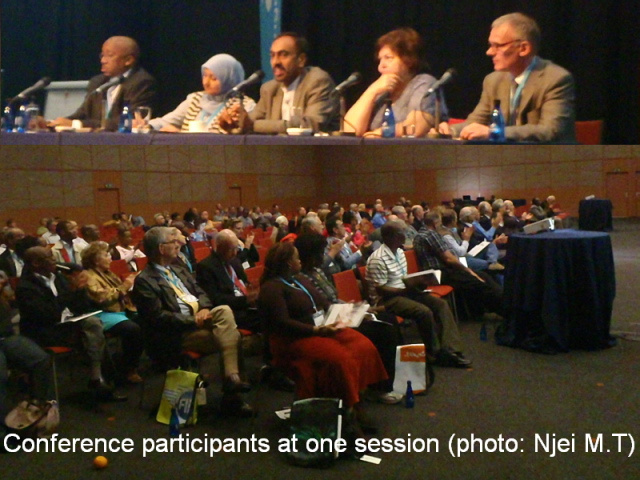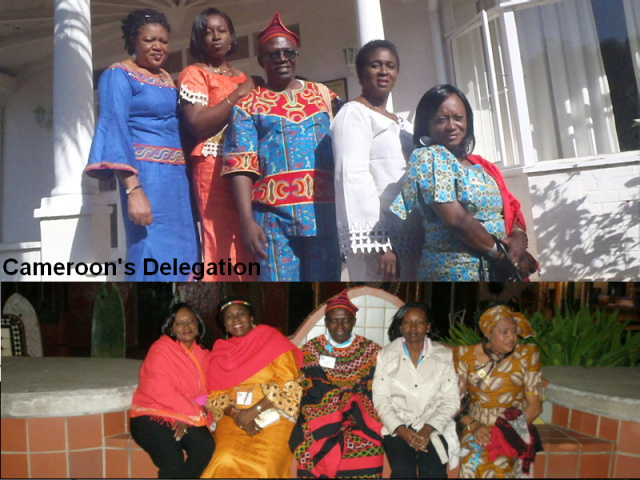9 Jun 2011
Durban, South Africa (29th May to 1st June 2011)
The Commonwealth Pharmacists’ Association held their biannual Conference in Durban, South Africa under the theme ‘versatile, responsive, aware’ More than 500 pharmacists from about 22 countries assembled in Durban’s imposing International Conference Center to listen to over two dozen speakers and exchange views especially on non-communicable diseases (the focus for this year’s conference).
The conference started with a welcome speech from Ivan Kotze, outgoing president of the Commonwealth Pharmacists’ Association. Explaining how the CPA is structured and works, Ivan said that apart from the business of the CPA, the conference offers the opportunity for pharmacists from the 43 CPA member countries to meet and discuss their practices, share their problems and find solutions to many professional challenges.

In her own welcome speech, the president of the Pharmaceutical Society of South Africa, Sybil Seoka likened the Conference to the successful hosting by South Africa of the 2010 FIFA soccer world cup. She enjoined participants to live up to the challenge of helping our political leaders accomplish the millennium development goals especially in relation to advancing pharmaceutical care.
Another welcome speech came from Bada Pharasi, the president of the South African Pharmacy Council who said the Conference gave pharmacists the “opportunity to share their successes and frustrations”.
A message from the Academic organizing committee highlighted the fact that pharmacy has not paid enough attention to the “growing challenge of chronic non communicable diseases” The message noted the following data released at the recent World health assembly in Geneva:
36 million of the 57 million global deaths in 2008 were due to non-communicable diseases
29% of the non communicable disease deaths in low and middle income countries in 2008 occurred before the age of 60.
80% of premature heart disease, stroke and diabetes can be prevented.
This knowledge was instrumental in helping the academic organizing committee to select the lecture topics to reflect the current challenges of the pharmacy profession in relation to non communicable diseases. These include: “ The consequences of healthcare financing options, access to medicines, quality of medicines, the need to provide appropriate pharmaceutical workforce and the impact of rapid urbanization on the health of peoples of the commonwealth.
The representative of South Africa’s Minister of Health welcomed the participants and briefly shed light on what is happening in her country in relation to the profession. She said that “South Africa is in search of health reform”. Among prominent issues currently being discussed include; the National Health Insurance, the establishment of the office of standard compliance “to improve quality and maintain it as a way of life.” She cited the Western Cape as having established a “chronic medication module” that is worth emulating.

A Keynote address “Health and the City” was presented by the president of the Commonwealth Association of planners (Christine Platt).
She started by saying that the critical issues facing our cities in the 21st century include rapid urbanization, the urbanization of poverty and climate change.
Since 2009 more than 50% of the world is urban. The Commonwealth is home to 2 billion people. It is estimated that between 2000 and 2015, there will be a 73% urban growth in the Commonwealth. The number of slum dwellers in the commonwealth is growing at the rate of 10million per year. Comparing the release of Carbon dioxide in the atmosphere within the Commonwealth countries, she said that 20 metric tons of carbon dioxide per person are released in Canada compared to 1 metric ton per person in poor commonwealth nations. 707 urban settlements in the Commonwealth lie within the low elevation coastal zone. UN predicts that there will be 150 million climate change refuges in the next 50 years. Increased temperatures will translate into increase in diseases like malaria. There is unprecedented urban development, increase in high rise buildings and increased isolation. She mentioned, for example that the number of Americans living alone account for more than 26% of households. The current approach of many Governments to urban problems is akin to curative rather than preventive medicine. Planning has to be strategic, integrated and participatory. “We face fixing what is already wrong and leapfrogging into the 21st century”.
The activities of the day ended with the traditional PV Patel memorial lecture given by Dr Sylvia Anie. PV Patel was instrumental in the creation of the CPA. According to her, Commonwealth’s 54 member countries is home to more than 2 billion people of which half are 25 or below. “Health is one of the most fundamental of human rights”, she said and stressed (in line with the theme) that we have to embrace versatility within the profession, increase our awareness especially of non-communicable diseases by continuous education and be responsive to threats confronting the profession especially fake medicines. Pointing out that 30% of medicines in developing countries are fake, Dr Sylvia told the pharmacists to be courageous in the fight against fake medicines. “We must speak up when we can and where we can”.

The next three days were laden with different lectures, panel discussions, debates and CPA Council Meetings (mostly taking place simultaneously in different halls). In all there were at least two dozen lectures by eminent scholars and experts tackling different angles of subjects such as Millennium development goals, diabetes, asthma, health insurance, fake medicines, pharmacy practice and human resources amongst others.
On the eve of our departure from Durban, all participants were invited for dinner on the Phantom Ship at the Ushaka Marine World. It was an occasion to dine and watch different fishes swimming behind the glass walls separating us from the fish.
The conference came to a close in the afternoon of 1st June 2011 after the debate and adoption of the ‘Durban Declaration’—a document that reflects the position and commitment of pharmacists to combat non-communicable diseases.
A full text of the Durban Declaration and other conference documents are available on the CPA website at this link. http://www.commonwealthpharmacy.org
You can also view video of CPA Council Meeting at this link
http://www.youtube.com/watch?v=xJu6eV1n-L0
Related article: Social Dimension of our delegation's visit
http://www.njeitimah-outlook.com/articles/article/2076041/156959.htm
Njei Moses Timah
|